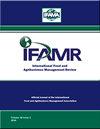Does new infrastructure outperform old infrastructure in China’s Agricultural Specialization: an empirical examination based on “One village One product”
IF 1.5
4区 经济学
Q3 AGRICULTURAL ECONOMICS & POLICY
International Food and Agribusiness Management Review
Pub Date : 2023-07-06
DOI:10.22434/ifamr2023-0006
引用次数: 0
Abstract
The realization of agricultural specialization in is often limited by the development of infrastructure, which is indicated by transaction costs, transportation conditions, and distance to markets; however, this might be remedied by institutional arrangements and collective action, as well as the development of internet and information technology. By using the data of China’s “One village, One product”, this article aims to examine the roles of new infrastructure and old infrastructure in agricultural specialization in China. In particular, whether new infrastructure of the emerging Internet and information technology can help these villages and towns to further expand their markets limited by old infrastructure is of great concern to us. The empirical results show that agricultural specialization is jointly determined by market distance and market scale, while internet and information technology itself can help in reducing the impact of market distances, the Internet and information technology reinforce the role of the market, which suggests that the Internet and information technology itself has not increased agricultural specialization in regions with unfavorable market conditions. Further policies facilitating new infrastructure are needed in remote villages and areas with backward markets to narrow location-induced inequalities by improving infrastructure and increasing public participation.中国农业专业化中新基础设施是否优于旧基础设施:基于 "一村一品 "的实证检验
农业专业化的实现往往受制于基础设施的发展,具体表现为交易成本、交通条件和市场距离;然而,制度安排和集体行动以及互联网和信息技术的发展可以弥补这一不足。本文利用中国 "一村一品 "的数据,旨在研究新基础设施和旧基础设施在中国农业专业化中的作用。特别是,新兴的互联网和信息技术等新基础设施能否帮助这些村镇进一步拓展受旧基础设施限制的市场,是我们十分关注的问题。实证结果表明,农业专业化是由市场距离和市场规模共同决定的,而互联网和信息技术本身有助于减少市场距离的影响,互联网和信息技术强化了市场的作用,这表明互联网和信息技术本身并没有提高市场条件不利地区的农业专业化程度。在偏远乡村和市场落后地区,需要进一步制定促进新基础设施建设的政策,通过改善基础设施和提高公众参与度来缩小因地理位置引起的不平等。
本文章由计算机程序翻译,如有差异,请以英文原文为准。
求助全文
约1分钟内获得全文
求助全文
来源期刊

International Food and Agribusiness Management Review
AGRICULTURAL ECONOMICS & POLICY-
CiteScore
2.90
自引率
0.00%
发文量
0
审稿时长
>12 weeks
期刊介绍:
The IFAMR is an internationally recognized catalyst for discussion and inquiry on issues related to the global food and agribusiness system. The journal provides an intellectual meeting place for industry executives, managers, scholars and practitioners interested in the effective management of agribusiness firms and organizations.
IFAMR publishes high quality, peer reviewed, scholarly articles on topics related to the practice of management in the food and agribusiness industry. The Journal provides managers, researchers and teachers a forum where they can publish and acquire research results, new ideas, applications of new knowledge, and discussions of issues important to the worldwide food and agribusiness system. The Review is published electronically on this website.
The core values of the Review are as follows: excellent academic contributions; fast, thorough, and detailed peer reviews; building human capital through the development of good writing skills in scholars and students; broad international representation among authors, editors, and reviewers; a showcase for IFAMA’s unique industry-scholar relationship, and a facilitator of international debate, networking, and research in agribusiness.
The Review welcomes scholarly articles on business, public policy, law and education pertaining to the global food system. Articles may be applied or theoretical, but must relevant to managers or management scholars studies, industry interviews, and book reviews are also welcome.
 求助内容:
求助内容: 应助结果提醒方式:
应助结果提醒方式:


